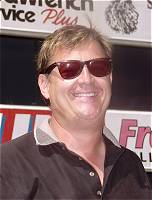
What Happened to
Drag Racing on Television?3/9/04

 can remember back to the times when there was
so little drag racing coverage in any newspaper
or on TV that when ABC's Wide World of Sports
would cover the U.S. Nationals, it was an event
to plan a party around. Nobody cared if we already
knew who'd won, we could read it in Drag News
or National Dragster, but we needed to see the
cars racing down the quarter mile, the drivers
talking, Garlits shaving, the crowd cheering,
we needed to be part of the U.S. Nationals if
we couldn't attend for one reason or another.
can remember back to the times when there was
so little drag racing coverage in any newspaper
or on TV that when ABC's Wide World of Sports
would cover the U.S. Nationals, it was an event
to plan a party around. Nobody cared if we already
knew who'd won, we could read it in Drag News
or National Dragster, but we needed to see the
cars racing down the quarter mile, the drivers
talking, Garlits shaving, the crowd cheering,
we needed to be part of the U.S. Nationals if
we couldn't attend for one reason or another.
Later, I remember the classic TV camera shot where we'd see a snow covered peak at the top of the hour and know the delayed-for-TV Winternationals coverage was coming on with the enthusiasm and knowledge of Steve Evans and Dave McClelland. Just to refresh my memory over the Winternationals rainout weekend, I popped in my Diamond P Drag Racing '93 videotape.
If you have one of those old Diamond P give-a-way videos sitting on the shelf, dust it off and take a look at it, you'll notice a seemingly simpler time in drag racing. At that time the coverage was about racing, not about the announcers. By the way, is there no resolution to the Diamond P -vs- NHRA dispute that would allow us to regain the video history of NHRA Drag Racing? Are the egos involved just that big?
Today with ESPN2 we get same-day coverage of what should be an exciting, compelling show, however when comparing the coverage of 2004 to those simpler days it just doesn't hold up. I now understand why the ESPN2 shows are not repeated on the network or a video copy of highlights given away as an NHRA membership benefit any longer.
After watching all of the ESPN2 broadcasts so far in this short season I want to make some observations on NHRA televised drag racing, 2004 style. I don't think I could do it better, I know I could make a better TV show.
First, nobody attends a drag race to sit in the stands and listen to the announcer. There's got to be a new way to look at televised drag racing coverage since Diamond P set the standard so long ago. I know we'll never have an announcer with the depth, humanity and pure talent of the late Steve Evans. There was a guy who ran drag strips, really knew racers and their personalities, understood the history of our sport and how to bring the fan into that inner circle. The same can be said of Dave McClelland, a guy who's down to earth, knows all the players and feels like the guy next door with whom we could have a beer.
Instead, we have cliché-ridden jokesters as announcer/commentators who could interchangeably cover bobsledding, ice skating or drag racing with the same level of sincerity and accuracy. During the Phoenix coverage Parker Johnstone characterized Larry Dixon as an "underdog" with a "pedigree" and looking for a "best in show"; it's time to revoke his metaphor license. The rigidity of NHRA's nitro oil down policy should be adapted to announcers too. An abundance of puns will get you bounced from the following week's event coverage and reduce your participation to winding up video cables once the show has been completed, along with a fine.
Dear Marty Reid, whether David Baca won or lost in the past against Clay Millican is a pointless statistic, no matter if they met only once or one hundred times. Listen to the interviewed drivers we hear on your show, the drivers say they are racing the track. One driver and team may have a statistical advantage on elapsed times based upon that weekend's performance, but if a driver lost in their last meeting over a year ago are you saying something important or just blabbing to fill dead air? Take a moment to remember the driver's phrase, "we are just trying to go from A to B." So many drivers repeat that axiom since drag racing has no corners, we have no high side or low side and we have no spotters ... its truly man and machine in the simplest form. The crew chief has either set the motor on kill or softened up the combination in anticipation of a slick, slippery track.
Bill Stevens, keep your questions short. Questions are posed to elicit answers, clear the air and a ascertain a point of view - not to prove how smart or clever the interviewer is. David Reiff, it is apparent that you know very little of the subject you cover. Have you ever read an NHRA rulebook? Did you know that the minimum weight of an NHRA Funny Car is 2,400 pounds including the driver? You, of all the ESPN announcers, seem to skate through situations knowing very little about drag racing.
|